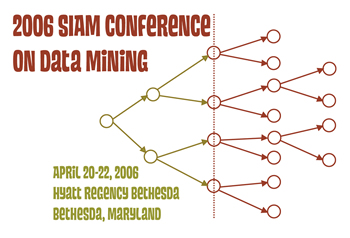
Link Analysis, Counterterrorism and Security 2006
The proceedings of the Fourth Workshop on Link Analysis, Counterterrorism and Security
Held in conjunction with:
Sixth SIAM – International Conference on Data Mining (SDM 06)
Hyatt Regency Bethesda
Bethesda, Maryland
22nd April 2006.
Organizers:
Ankur Teredesai (Rochester Institute of Technology) and
Kathleen Carley (Carnegie Mellon University)
Consequently, the body of research in areas such as link analysis, social network analysis, dynamic network analysis, text analysis, etc. draws heavily upon existing techniques and tools used in data mining and machine learning. In return, the algorithms developed contribute significantly to the advancement of the data mining and machine learning techniques.
This one-day workshop was organized with the specific objective of bringing together researchers and practitioners from varied walks of data mining to demonstrate the state-of-the-art in link analysis, counterterrorism and security. This year we encouraged both practical and theoretical perspectives to solving problems in these domains. We wanted to demonstrate that it is important to understand how information flows in organizations, how people form relationships and connections, and how these processes affect decision-making. Research papers presented in this workshop are but a mere sampling of the outstanding work that is being conducted in this area. The organizers invited a reputable team of 15 area experts to serve on the program committee. Each submission was reviewed by at-least two of these experts and by the organizers. We received sixteen submissions and after careful review invited ten papers for publication. In addition to the objectives of previous years workshops we specifically tried to bring together social network statisticians with computer science data miners and the final program reflects this intension. We expect this broadening in participation to cultivate new relationships by providing an international forum to discuss the advances in the field of link analysis.
Knowledge Perception Analysis in a Social Network
Cost-Sensitive Learning with Conditional Markov Networks
Link Prediction using Supervised Learning
Relationship Discovery in Large Text Collections Using Latent Semantic Indexing
Link Analysis of Higher-Order Paths in Supervised Learning Datasets
Community detection in a large social dataset of European Projects
Detecting Word Substitution in Adversarial Communication
The TOPHITS Model for Higher-Order Web Link Analysis
Organizational Response to the Turmoil of Personnel Turnover
On Effectiveness of Wiretap Programs in Mapping Social Networks